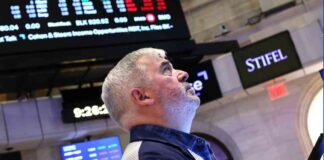Workday, a leading provider of finance and human resources software, saw a significant rise in its stock price following the announcement of its fiscal second-quarter results. Co-CEO Carl Eschenbach appeared on CNBC’s “Squawk Box” at the World Economic Forum Annual Meeting in Davos, Switzerland, on Jan. 18, 2024, to discuss the company’s impressive performance. Workday’s shares surged by 12% after the company reported earnings per share of $1.75, adjusted, compared to the expected $1.65, and revenue of $2.085 billion, exceeding analysts’ estimates of $2.071 billion.
Financial Success and Growth Goals
Workday’s revenue increased by approximately 17% year over year in the quarter ending July 31, with subscription revenue growth also reaching 17%. The company’s net income rose to $132 million, or 49 cents per share, up from $79 million, or 30 cents per share, in the same quarter a year ago. Looking ahead, Workday set ambitious goals to further expand its adjusted operating margin through 2027. In the 2025 fiscal year, the company aims for an adjusted operating margin of 25.25%, surpassing its previous forecast of 25%. CFO Zane Rowe anticipates a further increase to 30% in the 2026 and 2027 fiscal years, accompanied by an annual subscription revenue growth of 15%.
Analyst Expectations and Market Response
Following the positive earnings report, analysts raised their price targets for Workday stock. Deutsche Bank analysts, led by Brad Zelnick, increased their 12-month price target to $275 from $265, maintaining a hold rating on the stock. They highlighted the company’s commitment to achieving a 30% operating margin sooner and to a greater extent than expected. Other analysts from Citi, Evercore ISI, and Piper Sandler also raised their price targets for Workday, reflecting confidence in the company’s growth trajectory.
Market Conditions and Economic Outlook
Although Workday has shown resilience in challenging economic conditions, CFO Zane Rowe acknowledged the cautious approach organizations are taking before signing contracts. Despite the slowdown in headcount growth among existing customers, Workday remains focused on scaling its processes and optimizing product development and go-to-market initiatives. Federal Reserve Chair Jerome Powell’s indication of a potential rate cut could benefit cloud software companies like Workday, as investors may shift towards defensive investments in response to economic uncertainties.
CEO Carl Eschenbach emphasized that the current IT spending environment may persist as the new norm, requiring companies to adapt and innovate continuously. Workday’s strong product offerings position it well to navigate evolving market conditions and sustain its growth momentum. The WisdomTree Cloud Computing Fund, which includes Workday, experienced a positive trading session following the company’s earnings report, reflecting investor confidence in the cloud software sector.
Future Outlook and Strategic Initiatives
As Workday looks towards achieving its long-term financial goals, the company remains committed to enhancing its operational efficiency and driving sustainable growth. By focusing on targeted growth investments and aligning product development with market demands, Workday aims to capitalize on emerging opportunities in the finance and HR software market. CEO Carl Eschenbach reiterated the company’s confidence in its product portfolio and its ability to meet the evolving needs of customers in a rapidly changing business landscape.
Overall, Workday’s strong performance in the fiscal second quarter and its strategic vision for future growth have positioned the company as a key player in the finance and HR software industry. With a focus on innovation, operational excellence, and customer satisfaction, Workday is well-equipped to navigate the challenges of a dynamic market environment and drive continued success in the years ahead.






















